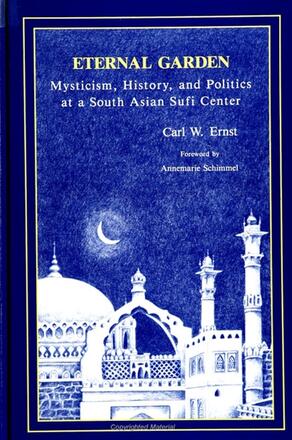
Eternal Garden
Mysticism, History, and Politics at a South Asian Sufi Center
Alternative formats available from:
Reveals the mystical teachings and practices of the Chishti Sufi order as taught by the ecstatic Shaykh Burhan al-Din Gharib (d. 1337) and his disciples.
Description
Ernst's research, based on rare Persian manuscripts preserved in Sufi shrines in the medieval town of Khuldabad, a major center of pilgrimage in the Indian Deccan, reveals the mystical teachings and practices of the Chishti Sufi order as taught by the ecstatic Shaykh Burhan al-Din Gharib (d. 1337) and his disciples. The book clarifies the diverse historiographical approaches found in an array of narratives. It redefines major topics in the often emotionally charged study of religion and history in South Asia, and it raises provocative theses on much-argued topics such as the basis of Islamic political power in South Asia and the alleged roles of Sufis as warriors and missionaries.
Carl W. Ernst is Associate Professor and Chair of the Department of Religion at Pomona College in Claremont, California. A specialist in classical Sufism and Indo-Muslim culture, he is the author of Words of Ecstasy in Sufism, also published by SUNY Press.
Reviews
"This is an extraordinary piece of scholarship. I like the constant sense of discovery that Ernst brings to his work, not only with regard to the literary archival material, which he has arrayed in painstaking detail, but also his enthusiasm about discovering new ways of seeing oral data in relationship to textual data, and textual data in relationship to ritual data.
"Reading this book has taken me far afield in my own thought, and I must end by remarking that, like the pilgrim to Khuldabad, I have come back from the experience much enriched and full of a certain spirit of renewal that I would not have imagined nor found before this trip. Eternal Garden marks a major, transformative advance in the study of institutional Sufism, especially, but not solely, in South Asia. " — Bruce B. Lawrence, Duke University
"One of the most exciting and readable contributions to the study of Islam in India to appear in years. " — Middle East Journal
"No other sacred space in Islamdom has been subjected to such thorough, penetrating, and illuminating historical research. " — Digest of Middle Eastern Studies
"The book may serve well as a useful text for advanced courses that seek to explore the complex interplay of Islam and politics in precolonial India … It will certainly be long regarded as an important contribution to the cultural history of Indian Sufism. " — International Journal of Middle East Studies
"An important contribution to the growing field of scholarship on South Asian Islam and the nature of Islamic society in South Asia. " — Iranian Studies